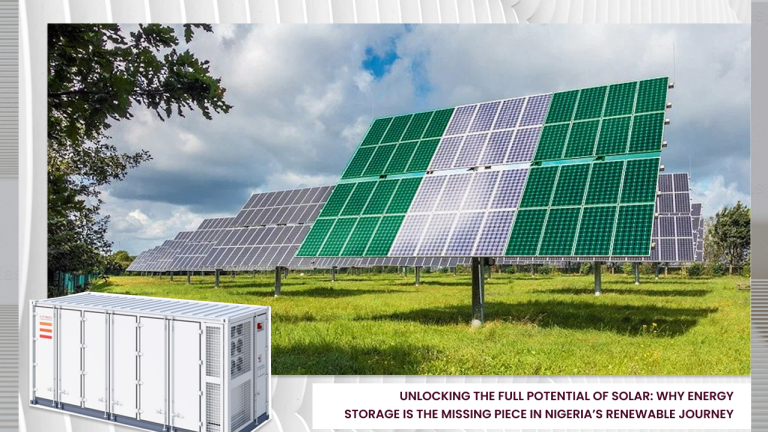In Nigeria’s energy landscape, reliability is not just a convenience—it’s a competitive advantage. Frequent power interruptions, rising diesel costs, and limited grid stability have left businesses searching for sustainable solutions that ensure round-the-clock operations.
While solar energy has grown rapidly across the country, many organizations still face a familiar challenge: how to store excess energy for use when the sun isn’t shining. This is where energy storage systems (ESS) step in—providing integrated storage solutions that work for businesses of all sizes.
This article explores how modern solar energy storage systems can help Nigerian businesses reduce costs, improve reliability, and transition toward a cleaner, more resilient power model—and how Actolog Solutions bridges that technology to the local market.
The Missing Link in Nigeria’s Solar Revolution
Over the past decade, Nigeria has witnessed a steady rise in solar installations. From SMEs to large industrial facilities, solar has become an attractive alternative to grid power and diesel generators. However, solar alone cannot guarantee continuous power.
During daylight hours, panels may produce more energy than a business needs, while at night or during cloudy weather, production drops sharply. Without an efficient storage system, much of that valuable solar energy is wasted.
Energy storage systems solve this problem by capturing surplus electricity and making it available when needed — stabilizing supply and reducing dependence on expensive backup generators.
Smart Energy Storage: The Technology Behind the Promise
Modern solar energy storage systems are built around lithium-ion battery technology and intelligent energy management software that optimize how energy is stored, discharged, and managed. These systems are modular and scalable — meaning a business can start small and expand as its energy needs grow.
In simple terms, a well-designed ESS combines high efficiency, durability, and smart control in one integrated package.
How Energy Storage Systems Work
An energy storage system (ESS) is essentially a large, rechargeable battery designed for industrial use. When solar panels produce electricity, part of it powers your facility directly, while the rest charges the batteries. Later — at night or during power cuts — the batteries discharge stored power to keep your operations running.
Modern ESS typically feature:
-
High round-trip efficiency (90–95%)—meaning minimal energy loss during storage and discharge.
-
Deep depth of discharge (80–90%) – allowing more usable energy per cycle.
-
Long cycle life (6,000–10,000 cycles) – translating to roughly 10–15 years of use under proper management.
-
Thermal control – smart cooling and heat management to maintain battery health in hot climates like Nigeria’s.
These features make them ideal for Nigerian environments where ambient heat, grid instability, and heavy load demands are common.
Cost, Value, and ROI: Understanding the Numbers
The most common question Nigerian business owners ask is, “How much does it cost — and is it worth it?”
While costs vary by capacity, configuration, and installation, here’s a general estimate for commercial-scale systems (250–500 kWh):
-
Initial Investment: ₦250 million – ₦400 million
-
Expected Lifespan: 10–15 years
-
Maintenance Costs: Minimal (mainly software updates and monitoring)
-
Payback Period: 3–5 years (depending on diesel usage and energy tariffs)
When compared with diesel generators — which can consume ₦50–₦80 million worth of fuel per year for a similar load — the long-term savings are substantial.
More importantly, energy storage offers predictability. Businesses are no longer exposed to fluctuating diesel prices or grid failures. This stability translates to improved planning, reduced operational downtime, and lower total cost of ownership.
Challenges and Realities of Storage in Nigeria
While energy storage is a promising technology, businesses must also be aware of the challenges:
-
Battery Degradation
Over time, batteries lose capacity due to repeated charging and discharging. However, with proper management and environmental control, degradation can be limited to less than 2% per year. -
Thermal Management
Nigeria’s high temperatures can accelerate wear on poorly designed systems. Effective storage solutions include active cooling systems and automated heat sensors to preserve performance. -
Replacement and End-of-Life Costs
After 10–12 years, batteries may require partial replacement. Actolog Solutions supports this lifecycle by offering maintenance, upgrades, and safe disposal options locally. -
Grid Integration and Policy
Current Nigerian grid infrastructure and policies are not yet fully optimized for energy storage. Incentives such as feed-in tariffs, tax breaks, or duty waivers could make adoption faster. Encouragingly, several pilot programs led by the Rural Electrification Agency (REA) and NERC are already showing positive momentum.
Building Local Capacity: The Actolog Advantage
One of the biggest hurdles in deploying advanced systems in Nigeria is the supply chain gap — spare parts, battery modules, and trained technicians are often limited.
Actolog Solutions bridges this gap. As a leading provider of Integrated Renewable Energy Solutions (IRES), we partner with world-class manufacturers to deliver end-to-end services — from system design and installation to monitoring and maintenance.
Our local team ensures that Nigerian businesses don’t just buy equipment but gain a complete energy ecosystem:
-
Local servicing and on-site support
-
Tailored design to match load patterns and business needs
-
Remote monitoring and predictive maintenance tools
-
Warranty support and parts availability
By localizing support, Actolog reduces downtime and protects your investment throughout the system’s lifecycle.
Beyond Batteries: The Future of Smart Energy in Nigeria
While battery storage is the most visible form of energy storage today, it’s only one piece of the puzzle. The future of Nigeria’s energy stability will rely on hybrid systems that combine:
-
Solar + Storage + Grid + Diesel for flexible reliability
-
Microgrids that manage power locally and reduce transmission losses
-
Smart load management and AI forecasting to optimize energy use
Such systems create a pathway toward smarter, more sustainable energy infrastructure across the country.
Scaling Energy Storage Across Nigeria
For Nigeria to fully benefit from renewable energy, storage must move beyond individual businesses to grid-level deployment. Large-scale batteries can help stabilize voltage, manage peak demand, and support renewable integration into the national grid.
Countries like South Africa and Kenya are already piloting utility-scale storage projects that store hundreds of megawatt-hours. Nigeria can take the same path through public-private partnerships, where government incentives meet private investment.
As the nation’s demand for reliable energy grows, integrating storage at industrial parks, estates, and rural electrification projects can transform both productivity and sustainability.
Conclusion: Powering Business Resilience Through Smart Storage
Energy storage is no longer a futuristic concept—it’s a present-day business solution. For Nigerian companies, it means independence from unreliable power, protection from rising fuel costs, and a decisive step toward sustainability.
Modern solar energy storage systems provide a globally proven foundation for this transformation. And with Actolog Solutions offering local expertise, installation, and after-sales support, Nigerian businesses now have access to world-class energy technology adapted for local realities.
It’s time to take control of your energy future—not just for today, but for the next decade of growth.








